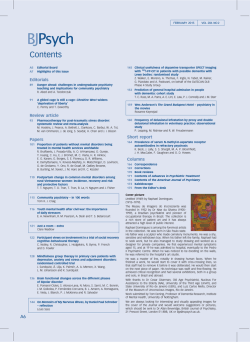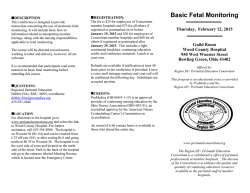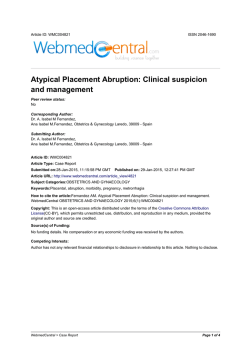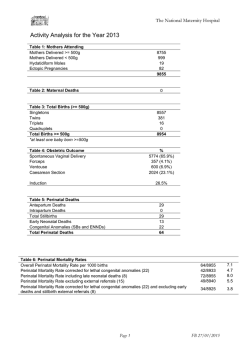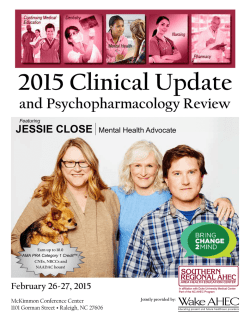
1001 Critical Days Lecture Series Programme 2014 2015
1001 Critical Days Lecture Series @ Parliament 2014/15 Hosted by Andrea Leadsom MP, Frank Field MP and Tim Loughton MP The lecture series is designed to demonstrate innovative science and best practice within the first 1001 days of a child's life - the period from conception to age two. @first1001days | www.1001criticaldays.co.uk Contents Lecture 1: Baby Bonds: foundation for lifelong health Lecture 2: Family and Parenting: the social impact of babies Lecture 3: ‘Supporting the Parent-Infant Relationship in an Obstetrics’ Department: A Clinical Presentation’ Lecture 4: Seizing the day to improve the nurture of our youngest children Lecture 5: Perinatal mental health: A paradigm shift Lecture 6: 1001 Critical Days: First Relationships Lecture 7: Antenatal mental health: Keeping the baby in mind @first1001days | www.1001criticaldays.co.uk Baby Bonds: foundation for lifelong health Wednesday 11th June |15:00-17:00 |Committee Room 9 Professor Charles Zeanah Dr. Zeanah is Mary Peters Sellars-Polchow Chair in Psychiatry, Professor of Psychiatry and Pediatrics, and Vice-Chair for Child and Adolescent Psychiatry in the Department of Psychiatry and Behavioral Sciences at the Tulane University School of Medicine in New Orleans. He also directs the Institute of Infant and Early Childhood Mental Health at Tulane. Throughout his career, he has studied the effects of adverse early experiences and interventions designed to enhance recovery. He is the editor of three editions of the Handbook of Infant Mental Health and with Charles Nelson and Nathan Fox, the co-author of Romania’s Abandoned Children: Deprivation, Brain Development and the Struggle for Recovery and author of more than 250 scientific publications. Learning to Love Attachment describes a young child’s tendency to seek comfort, support, nurturance, and protection selectively from a small number of adult caregivers. Human infants are biologically predisposed to form attachments to caregivers and do so except in conditions of serious deprivation. Typically, infants form “focused” attachments in the second half of the first year of life, heralded by the onset of behaviours that are qualitatively distinct from previous behaviours. Young children’s attachments may be different with different caregivers, depending on the kinds of experiences that they have with those caregivers. Healthy, secure attachments protect children from maladaptive outcomes, especially those who begin life experiencing various forms of extreme caregiving adversity. @first1001days | www.1001criticaldays.co.uk Professor Marian J. Bakermans – Kranenberg Marian J. Bakermans-Kranenburg is a professor of child and family studies at Leiden University, the Netherlands. Her research focuses on attachment and emotion regulation in parents and children, and the interplay between ‘nature’ and ‘nurture’. She has been involved in several studies on institutionalization, adoption, and parenting interventions. Family Matters The effects of parenting and the rearing environment have been queried by behavioural genetic research. The current generation of genetic studies however ascribes more influence to parenting and the interplay between nature and nurture. Moreover, the environmental impact on gene expression underlines the significance of parenting, and the massive catch-up after adoption or placement in foster care in previously institutionalized children demonstrates the importance of growing up in a family. Parents need support in parenting their children, in particular with children who suffer from delays and developmental or behavioural difficulties, and challenge their caregivers’ expectations and parenting capacities. @first1001days | www.1001criticaldays.co.uk Family and Parenting: the social impact of babies Thursday 26th June |14:00-16:00 |Committee Room 8 Professor Pasco Fearon Pasco Fearon is Professor of Developmental Psychopathology at University College London, and Director of the Anna Freud Centre’s Developmental Neuroscience Lab. He is a clinical and developmental psychologist by training and I also jointly direct UCL’s Doctoral Training Programme in Clinical Psychology. His main work is on the development of attachment security and insecurity, but he also conducts studies of the genetics and biology of early socio-emotional development and intervention studies, particularly programmes aimed at promoting secure attachment and reflective parenting. Professor Lynne Murray Lynne Murray is a Research Professor in Developmental Psychopathology at the University of Reading, and Professor Extra-ordinary at Stellenbosch University, South Africa. She co-directs the Winnicott Research Unit. Her work concerns the development of children growing up in difficult circumstances (e.g., where their parent is depressed or anxious, or lives in conditions of high socio-economic adversity, or where the child has some congenital problem or temperamental difficulty), with a focus on the role of parenting. This research has involved longitudinal studies (e.g. her Cambridge study of depressed and well mothers and their children spanning birth to 22 years), experimental investigations, and treatment studies to investigate the most effective means of supporting parenting. Her work has mainly been funded by the MRC, the Wellcome Trust, the Department of Health and the WHO. She has published almost 200 academic journal papers and book chapters, and is the author of 'The Social Baby' (2000), and 'The Psychology of Babies: how relationships support development from birth to two' (2014). @first1001days | www.1001criticaldays.co.uk ‘Supporting the Parent-Infant Relationship in an Obstetrics’ Department: A Clinical Presentation’ Monday 27th October |14:00-16:00 | Boothroyd Room, Portcullis House Opening Speaker Dan Poulter MP, Parliamentary Under-Secretary of State for Health. Dan Poulter was appointed Parliamentary Under-Secretary of State at the Department of Health in September 2012. He is the Conservative MP for Central Suffolk and North Ipswich. He currently works as an obstetrician. “We want to do everything we can to make sure women and families get as much support as possible throughout pregnancy and beyond, and we need to see a step change in the quality of mental health support available in the perinatal period. “Specialist mental health doctors and midwives are crucial in helping women at risk of suffering from depression, and we will ensure that there are enough trained mental health midwives for the whole country. This means women will be much more likely to get the help and support they need, which will go on to have huge benefits for families and children. “We are already increasing the number of midwives and health visitors, and we have increased the number of vulnerable women and families who will benefit from family nurses. But we are now going even further, so that more women will get the right support before, during and after child birth.” @first1001days | www.1001criticaldays.co.uk Dr Kathryn Hollins Dr Kathryn Hollins, MBChB MSc (Anthropology) MRCPsych, is Consultant Psychiatrist and Psychotherapist for the Perinatal and Parent-Infant Mental Health Service. She is Clinical Lead for the Service, which provides assessment, treatment and joint management for complex developmental and mental health problems affecting women, partners and infants during pregnancy and the first postnatal year. Her Psychiatry specialisation is in Child and Adolescent Psychiatry as well as Adult Psychotherapy. She appreciates the wide range of skills her psychodynamic, systemic family therapy and CBT trainings have given her in approaching all her clinical work as a doctor and psychiatrist. Danny O’Shea Danny O’Shea, BSc Sociology, MA Prof Ch. Psych. Psych, is a Senior Perinatal Child Psychotherapist in the Perinatal and Parent-Infant Mental Health Service at Chelsea and Westminster Hospital. He is responsible for delivering perinatal outreach services to Wandsworth South West London for parents and babies at risk of emotional breakdown. In partnership with Children’s Centres, and GP Practices located in Wandsworth he has been centrally involved in establishing an integrated and innovative way of working in delivering an early intervention mental health service outreaching into the local community. Pregnancy is a remarkable developmental journey for both mother and infant. It provides an extraordinary window of opportunity to address longstanding psychological distress and disorder, often originating in early life experiences of abuse or neglect, trans-generational issues, as well as later trauma and loss. The Perinatal and Parent-Infant Mental Health Service at Chelsea and Westminster Hospital is a place where these complex and multi-layered presentations can be identified and addressed at the heart of maternity care, thus potentially transforming the lives of the infant, mother, couple and family. This presentation is primarily clinical and aims to introduce some key developmental experiences in pregnancy and the early postnatal period. Women’s stories will lead us through the’ four’ trimesters of pregnancy via a developmental timeline thus bringing to life the huge potential for immediate and future change via Perinatal Psychotherapy. @first1001days | www.1001criticaldays.co.uk Seizing the day to improve the nurture of our youngest children - In celebration of the 25th Anniversary of UNCRC Thursday 20th November |14:00-16:00 |the Boothroyd Room, House of Commons Opening Speaker The Right Honourable Dame Tessa Jowell DBE MP Dame Tessa Jane Jowell DBE (born 17 September 1947) is a British Labour Party politician, who has been the Member of Parliament (MP) for Dulwich and West Norwood since 1992. Tessa was one of the architects of Sure Start Children’s Centres with a particular interest in the early years, originally having trained as a social worker. In June 2014 she presented a petition to Amina Mohammed, the UN Secretary General’s Special Advisor on Post-2015 Development Planning, highlighting the importance of early childhood development internationally and as a contribution to the post 2015 Millennium Development Goals. @first1001days | www.1001criticaldays.co.uk Sir Al Aynsley Green Sir Al Aynsley-Green was University Lecturer is Paediatrics and Fellow, Green College, University of Oxford, then James Spence Professor of Child Health in the University of Newcastle upon Tyne, and Nuffield Professor of Child Health and Director of Clinical Research at Great Ormond Street Hospital for Children; he was then first National Clinical Director for Children in the Department of Health in Government, and the first independent statutory Children’s Commissioner for England from 2005-10 He is now Professor Emeritus of Child Health at University College London, and Founder of Aynsley-Green Consulting, engaging with governments and organisations worldwide on children, childhood and children’s services. He was knighted by HM the Queen for his services to children and young people in 2006 and in June 2013 received the James Spence Medal of the Royal College of Paediatrics and Child Health, this being the highest accolade for a British Children’s Physician. He is President-elect of the British Medical Association for 2015-16 Children are our most precious national resource; they are the living messages to a time we will not see, and new scientific advances are showing the crucial importance of the early years and especially the first 1001 days from conception until age 2 as a springboard for neuro-cognitive development, life-long health and well-being and socioeconomic success. @first1001days | www.1001criticaldays.co.uk Dr Gabriella Conti Gabriella has a BSc in Law from the University of Naples "Federico II", and a Diploma, MSc and PhD (2008) in Economics from the University of Essex. Prior to coming to UCL, she was first Postdoctoral Scholar in the Department of Economics, and then Research Associate (Assistant Professor) in the Harris School of Public Policy at the University of Chicago. Gabriella's research draws on both the biomedical and the social sciences with the aim of understanding the developmental origins of health inequalities, and the behavioural and biological pathways through which early life conditions affect health throughout the life course. She is currently working on projects on the health effects of early life interventions, both in humans and in nonhuman primates; on the importance of prenatal investments and fetal development for long‐term outcomes; and on the effects of health insurance on health in developing countries. Dr Gabriella Conti and Professor Sir Al Aynsley-Green bring to this event their extensive international perspectives from work in Canada, the USA, Finland and Italy on how the economic and political arguments for investing in the earliest years are being taken forward. Recent evidence on the importance of investing in early childhood development based on a lifecycle approach to human development will be reviewed. The long-term costs caused by early life adversity on the biology of the body will be discussed, and evidence on enrichment interventions will be presented. The current political and practical focus in England will also be reviewed with exemplars of best practice and areas for improvement. The construct of the 'nurture' of young children will be explored especially in the context of the UN convention on the rights of the child arguing that nurture should be everybody's business - parents and families, schools, communities, faiths, voluntary organisations and national and local government. Proposals will be explored for practical toolkits through which local civil society, in partnership with the state, reclaims its responsibility for its youngest children thereby 'creating communities with resilient children at their hearts'. @first1001days | www.1001criticaldays.co.uk Perinatal mental health: A paradigm shift Tuesday 13th January 2015 |14:00-16:00 |Committee Room 14, House of Commons Opening Speaker Dr Liz McDonald is a Perinatal Psychiatrist with many years of both clinical experience and development of community and in-patient perinatal mental health services. She is Chair of the Perinatal Faculty at the Royal College of Psychiatrists, Chair of the Pan-London Perinatal Mental Health Network, Member of the Independent Advisory Group for Maternal, Neonatal and Child Health, member of the guideline development group for the recently published NICE Guideline on Antenatal and Postnatal Mental Health and member of the advisory group for Maternal OCD. She lectures and trains on maternal mental health at local, regional and national levels as well as providing mentoring and support to a number of consultant psychiatrists. Dr Alain Gregoire Dr Alain Gregoire is Consultant Perinatal Psychiatrist, Honorary Senior Lecturer at the University of Southampton and Chair of the Maternal Mental Health alliance. He set up and leads the national award winning Hampshire Perinatal Mental Health Service, which provides comprehensive integrated community and inpatient services to women with severe mental health problems in pregnancy and postnatally. He has conducted research into perinatal services, mental health of mothers in prisons and other aspects of perinatal mental health. He began his postgraduate medical training in obstetrics, but on finding that the most ill women, who also received the worst care, were those with mental health problems, he switched to psychiatry and completed his training at the Maudsley Hospital and Institute of Psychiatry. @first1001days | www.1001criticaldays.co.uk Dr Gregoire will summarise the extensive research demonstrating the critical importance of good maternal mental health in pregnancy and postnatally to women, their children, families and society. He will explain the opportunities we have for effectively relieving suffering, disability and death and the potential for long term human and economic benefits in this generation and the next. The UK leads the world in research in this field and in the development of excellent models of integrated and efficient care and the NHS provides an exceptional platform for their delivery. Dr Gregoire will describe how we can apply this knowledge and experience to ensure equitable access to high quality preventative care which, furthermore, can provide a model for health and cost improvement across the NHS. Carmine Pariante is Professor of Biological Psychiatry at the Institute of Psychiatry, and Consultant Perinatal Psychiatrist in the associated South London and Maudsley NHS Trust. He investigates the role of stress in the pathogenesis of mental disorders and in the response to psychotropic drugs, both in clinical samples and experimental settings. His work focuses on depression and fatigue, with a particular interest in the perinatal period and in subjects with medical disorders. He has received numerous awards for his research: for example, from the National Alliance for Research in Schizophrenia and Depression (NARSAD), the American Psychiatric Institute for Research and Education (APIRE), and the British Association for Psychopharmacology. He has recently been awarded the 2012 “Academic Psychiatrist of the Year” Award from the Royal College of Psychiatrists. His dream is that new therapeutic tools targeting the stress system will soon be available to alleviate the suffering of patients with mental health problems. Professor Pariante's talk will focus on the mechanisms by which exposure to life adversities and development of mental health problems cluster together in consecutive generations, through transgenerational transmission. He will further explain how pregnancy is a period of vulnerability where women who have had mental health problems and life adversities are at particular risk of becoming depressed. In turn, depression in pregnancy, especially if left untreated, may compromise mother-infant relationship and induce biological changes in the baby via communication "in utero", both potentially increasing the risk that the child will also be hypersensitive to stress, will have difficult behaviour, and will eventually develop mental health problems in adolescence and adulthood. transgenerationtransmission of life adversities and mental health problem from one generation to the next. @first1001days | www.1001criticaldays.co.uk 1001 Critical Days: First Relationships Thursday 29th January 2015 | 14:00-16:00 | Committee Room 4a |House of Lords Sponsored by Lord Northbourne For the last 20 years, Lord Northbourne has spoken on children's and family issues in the Lords; and has chaired the Youth Department at Toynbee Hall, helping to run a summer programme for disadvantaged children from London's East End. "In our country today, most parents are doing a good job raising their children; but some need help. A small but significant minority of children are not getting the sort of early-childhood parenting they need. And so they go on to fail in school, disrupt the learning of others and pull down the standard of our school system. I have become convinced that we must do more to address these children's needs earlier, from conception to five years old”. Ben Lewing, Implementation Adviser, Early Intervention "There are two objectives which the current government shares with its Foundation predecessor: an improvement in educational outcomes in our schools and a reduction in inequality in our society. Ben joins the EIF having spent the previous decade working in local government on children’s strategy and partnerships, most recently as a Strategic Commissioner in Solihull leading on early help in the early years, "We can address both by paying closer attention thedomestic first three years of emotional wellbeing, speech and language therapyto and abuse. our children's lives - and particular, the lives of thehis most disadvantaged Although Ben qualified as ainsocial worker and started career working in children’s homes in Birmingham, he has specialised in children’s rights and participation, working for Save the Children UK and the Children and Young People’s Unit. @first1001days | www.1001criticaldays.co.uk Getting It Right for Families One of the Early Intervention Foundation's most recent publications 'Getting it right for families' is a review of integrated systems and promising practice in the early years. Currently, the way services are organised for families with young children can be too fragmented, resulting in missed opportunities to identify early signs of need and then coordinate support. Better integration can mean better public services for families who do not have to repeat their story to different professionals and get the help they need more swiftly. The report uses the experience of the EIF's Pioneering Places to provide practical advice for local areas on how they can improve early intervention services for families with young children and makes recommendations for national and local policy and practice. Dr Samantha Callan, Associate Director for Families & Mental Health at the Centre for Social Justice Dr Samantha Callan is recognised as a research and policy expert in the fields of family relationships, early years, mental health and domestic abuse. She is currently Associate Director for Families and Mental Health at the Centre for Social Justice, for whom she has chaired four major social policy reviews. She is also an honorary research fellow at Edinburgh University’s Centre for Research in Families and Relationships (CRFR). In her current role she advises politicians and policy-makers from across the political spectrum and is also a regular contributor to local and national media debates on many family-related and other subjects. Samantha will focus on the effects of post-natal depression on infant and subsequent child mental health and the importance of strengthening family relationships, particularly with the other parent, to mitigate these effects on the child as well as reduce symptoms in the mother. Poor couple functioning, especially where it leads to badly handled conflict and violence, can have a highly negative effect on infants’ development. Obviously safety is paramount and that can mean parents have to part. Yet early separation from a parent is a risk factor for poor mental health in adulthood. Where both partners are committed to change, and situational couple violence is the presenting type, policy must support effective interventions to address the intergenerational transmission of family breakdown. @first1001days | www.1001criticaldays.co.uk Dr Robin Balbernie – Parent Infant Partnership UK Robin Balbernie is clinical director of PIP UK, a charity dedicated to help establish infant mental health teams across the country. Previously he was consultant child psychotherapist in Gloucestershire. He also worked with Children’s Centres as clinical lead of the team providing an infant mental health service, known locally and nationally as ‘Secure Start’. He was involved with the Intensive Baby Care Unit at Gloucester Royal Hospital and ran supervision groups for Health Visitors for over 25 years. His interest in working with adopted children led him to the field of Infant Mental Health and early preventative intervention; and this became his speciality following a Winston Churchill Memorial Trust Travelling Fellowship to look at related projects in America. He is an advisor to the Association of Infant Mental Health and the WAVE Trust and was a member of the Young Minds’ Policy and Strategy Advisory Group. Brain development and first relationships This presentation will give a very brief overview of how and why the baby’s brain is directly affected by the quality of the first relationships within the family, and will include a description the way in which very adverse experiences can have a deleterious effect that will prove to be a serious disadvantage if no early intervention occurs. @first1001days | www.1001criticaldays.co.uk George Hosking, Founder, CEO and Research Co-ordinator – the WAVE Trust An economist, accountant, psychologist and clinical criminologist, George was one of the youngest ever senior managers in Unilever, then CEO of an international strategy consultancy. He has led nearly 30 successful international corporate turnarounds. In 1996 he set up the charity WAVE Trust to bring a business strategy approach to the challenge of reducing violence and child abuse in the world. As part of the Allen Review on Early Intervention he drafted its sections on the early years and he co-chaired the DfE/DH study which produced the report Conception to age 2 – the age of opportunity. In 2014 he was awarded an OBE for his work to reduce violence and child abuse. 70/30 Pioneer Communities 'Child maltreatment has prevalence rates in Europe of c.20%, may be responsible for almost 25% of mental disorders, and is a leading cause of health inequality and social injustice (WHO). It is a major cause of poor physical health, poor academic performance and violent crime. The vast bulk of UK services are reactive, not preventive. George will describe a 5-year primary prevention approach to breaking the inter-generational cycle of maltreatment which will be tested in 6 UK communities. Success in reducing maltreatment carries major economic payoffs for society. The research evidence from this study will inform future policy. @first1001days | www.1001criticaldays.co.uk Antenatal mental health: Keeping the baby in mind Wednesday 11th February 2015 |14:00-16:00 |Committee Room 10, House of Commons Antenatal mental health: Keeping the baby in mind This symposium will provide a forum to examine the moral, scientific, and economic case for investment in the antenatal period. Dr Seneviratne will examine the prevalence of mental health problems in the antenatal period, and the consequences in terms of their impact on the rapidly developing foetus; Dr Pawlby will discuss the role of the mother’s own childhood experiences in terms of her antenatal mental health and the intergenerational transmission of mental health problems; Professor Ayers will examine the impact of trauma and PTSD in the life-history of the pregnant woman; Dr Reissland will present her work on fetal behaviour and responses to maternal stress; Professor Glover will examine the economic costs of antenatal mental health problems and Professor Barlow will discuss evidence-based methods of working to support both the mother and unborn baby. Opening Speaker A pioneer in the field of consciousness and early parenting Julie Gerland is the Founder and Director of The Holistic Parenting Program: Preconception to Birth & Beyond… The program educates and empowers future parents from pre-conception preparation to after birth. She is a co-author, a passionate and compassionate international presenter, workshop leader and professional trainer. Julie currently represents a non-governmental organisation for prenatal education associations which enjoys Special Consultative Status with the Economic and Social Council of the United Nations. @first1001days | www.1001criticaldays.co.uk Dr Trudi Seneviratne MBBS, MRCPsych Consultant Adult and Perinatal Psychiatrist Dr Trudi Seneviratne is a consultant adult and perinatal psychiatrist. She is lead consultant for the specialist perinatal services and a lead for children’s safeguarding at the Trust. She leads the team in the assessment and management of women who experience a mental illness either during pregnancy or in the postnatal period and their families. Dr Seneviratne offers outpatient clinics at Lewisham Hospital and at King’s College Hospital. She was a committee member with the Perinatal Psychiatry Section of the Royal College of Psychiatry and was the first Chair of the London Regional Network in Perinatal Psychiatry. Dr Susan Pawlby Susan Pawlby is a Lecturer in Perinatal Psychiatry at King’s College London and a Clinical Psychologist on the Mother and Baby Unit, South London and Maudsley NHS Trust. Dr Pawlby has demonstrated the importance of maternal mental health in pregnancy in securing the wellbeing and mental health of the offspring 25 years later. @first1001days | www.1001criticaldays.co.uk Professor Susan Ayers Susan is a psychologist specialising in perinatal mental health. She leads the Centre for Maternal and Child Health Research at City University London. Susan is a chartered health psychologist and cognitive behaviour therapist. Her research examines women's mental health during pregnancy and after birth, with a particular focus on anxiety and post-traumatic stress disorder. Since obtaining her PhD from the University of London, Susan has worked at St. George's Hospital Medical School (London) and Brighton and Sussex Medical School (Sussex). Susan is lead author of Psychology for Medicine (2011) and editor of the Cambridge Handbook of Psychology, Health and Medicine (2007). She has given numerous invited lectures and workshops and was awarded the Annual Lecturer Prize by the Society of Reproductive and Infant Psychology in 2012. Professor Jane Barlow Jane Barlow D.Phil. FFPH (Hon) is Professor of Public Health in the Early Years at the University of Warwick and Director of Warwick Infant and Family Wellbeing Unit. Jane’s research interest is the role of the perinatal period in the aetiology of mental health problems, and in particular the evaluation of early interventions aimed at improving parenting practices and reducing the risk of child maltreatment. She is President of the UK Association of Infant Mental Health. @first1001days | www.1001criticaldays.co.uk Professor Vivette Glover Vivette Glover is Professor of Perinatal Psychobiology at Imperial College London. She studies the effects of the emotional state of the mother, on the developing fetus and on the child. Her group are also uncovering the biological mechanisms that may underlie such fetal programming. She has published over 400 papers. Dr Nadja Reissland Dr Nadja Reissland is a developmental psychologist specialising in fetal development and works with mothers and infants in both hospital and home settings. Dr Reissland is primarily interested in the effects of maternal stress, depression, and smoking on antenatal development. She has developed a unique method of categorising fetal behaviour and her research can lead to improvements in both fetal development and the pregnancy experience. Dr Reissland’ s research has been disseminated by many press organisations worldwide, including The Guardian, The Daily Mail, CBS News, The Globe and Mail, Le Figaro, and ABC News. She continues to publish her research in well-respected peer-reviewed journals. Dr Reissland is a Deputy Head of Durham University’s Science Faculty and a senior lecturer in the Psychology Department. @first1001days | www.1001criticaldays.co.uk Dedications Thank you to all sponsors, speakers and delegates who have contributed to the success of the 1001 Critical Days lecture series. It has provided a forum for science and policy to come together to highlight the importance of the conception to age two period and its moral, scientific and economic case for investment. @first1001days | www.1001criticaldays.co.uk
© Copyright 2026
